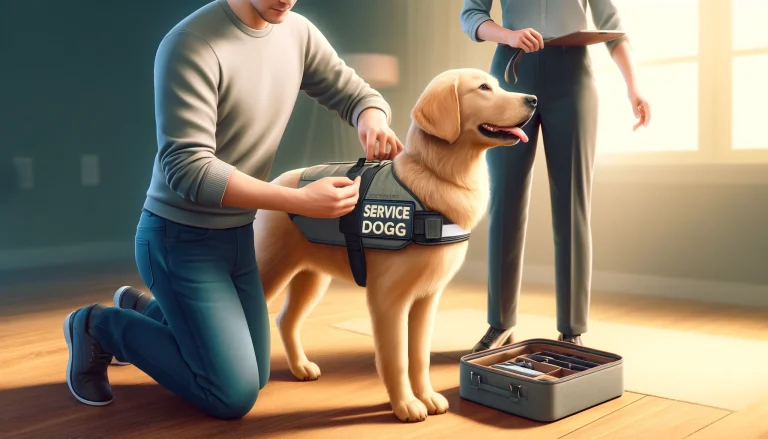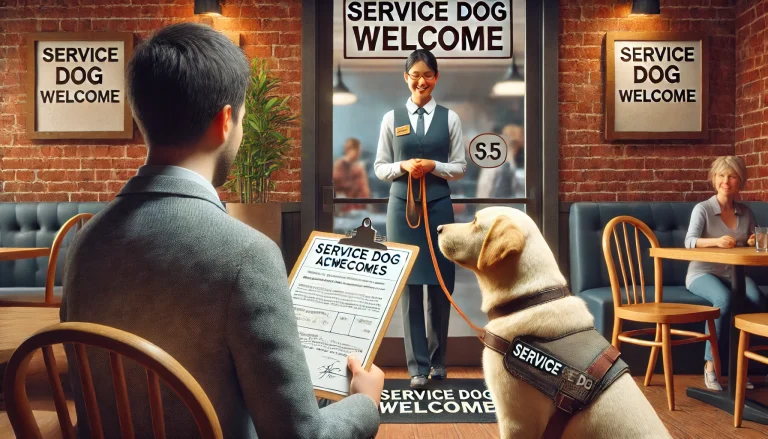Having a service dog can be life-changing. These loyal companions provide essential support to those with disabilities, helping them navigate daily life more easily. However, it is crucial to understand the Service Dog Legal Requirements, Service Dog Rights, and Service Animal Regulations to ensure your service dog is legally recognized. This guide will help you navigate these aspects and provide valuable insights into your rights and responsibilities.
Understanding Service Dog Legal Requirements
Service dogs are not just pets; they are working animals trained to assist individuals with disabilities. To ensure your service dog is legally recognized, you must meet specific requirements.
1. Definition and Training
A service dog must be trained to perform tasks directly related to the handler’s disability. This includes tasks like guiding individuals with visual impairments, alerting deaf individuals to sounds, pulling a wheelchair, alerting and protecting a person who is having a seizure, or calming a person with PTSD during an anxiety attack.
2. Documentation and Certification
While the Americans with Disabilities Act (ADA) does not require service dogs to be certified or registered, having proper documentation can help. This includes training certificates, medical documentation of the handler’s disability, and a letter from a healthcare provider.
3. Public Access Rights
Service dogs must be allowed to accompany their handlers in public places where pets are generally not allowed. This includes restaurants, hotels, and public transportation. However, the dog must be well-behaved and under the handler’s control.
Your Service Dog Rights
Understanding your rights as a service dog handler is essential. This knowledge can help you navigate public spaces and ensure your dog is treated appropriately.
1. Public Accommodation Rights
Under the ADA, service dogs are allowed to accompany their handlers in all areas of public accommodation. This means they can go wherever the public is normally allowed. This includes restaurants, stores, hospitals, and other public places.
2. Housing Rights
The Fair Housing Act (FHA) ensures that individuals with disabilities can keep their service dogs, even in housing with no-pet policies. Landlords must make reasonable accommodations for service dogs unless it would cause undue hardship or fundamentally alter the nature of the housing.
3. Employment Rights
The ADA also protects the rights of employees to have their service dogs with them at work. Employers must provide reasonable accommodations unless doing so would cause undue hardship. It’s important to communicate with your employer about your needs and how your service dog assists you.
4. Air Travel Rights
The Air Carrier Access Act (ACAA) allows service dogs to accompany their handlers on flights. Airlines must accommodate service dogs, but it is advisable to notify the airline in advance and provide any necessary documentation.
Service Animal Regulations
Compliance with service animal regulations ensures that your service dog remains legally recognized and can perform their duties effectively.
1. Behavior and Training Standards
Service dogs must be well-behaved in public. They should not bark, growl, or act aggressively. Proper training is crucial to ensure they respond correctly to their handler’s needs and behave appropriately in various environments.
2. Identification
While the ADA does not require service dogs to wear a vest or specific identification, many handlers choose to use them. This helps identify the dog as a working animal and can reduce misunderstandings in public spaces.
3. Health and Hygiene
Service dogs must be in good health and maintain proper hygiene. Regular veterinary check-ups, vaccinations, and grooming are essential. This not only ensures the dog’s health but also helps in maintaining their effectiveness as a service animal.
The Importance of Pet Insurance and Service Dog Products
1. Pet Insurance
Pet insurance is vital for service dogs. It ensures that your dog receives the best possible care without financial strain. Insurance can cover routine check-ups, vaccinations, and unexpected medical expenses. A well-insured service dog is healthier and more effective in performing their duties.
2. Service Dog Products
Investing in high-quality service dog products is crucial. This includes vests, harnesses, leashes, and training tools. These products help in training and ensuring that your dog is easily identifiable as a service animal. Quality products enhance the dog’s comfort and ability to perform their tasks effectively.
Steps to Ensure Your Service Dog is Legal
1. Proper Training
Ensure your service dog receives proper training from a reputable source. Whether you choose professional training or a self-training program through ServiceDogOwners.com, the dog must be able to perform tasks related to your disability.
2. Maintain Documentation
Keep all relevant documentation, including medical records and training certificates. While not required by the ADA, having these documents can help in situations where the legitimacy of your service dog is questioned.
3. Stay Informed
Stay updated on Service Animal Regulations and any changes in the law. This ensures that you and your service dog are always compliant with current legal standards.
4. Regular Health Checks
Schedule regular veterinary visits to keep your service dog in optimal health. A healthy dog is more capable of performing their duties effectively.
5. Use Proper Identification
Consider using a vest or ID card to identify your service dog. While not legally required, it can prevent misunderstandings and ensure smoother access to public places.
Legal Challenges and How to Handle Them
Despite legal protections, you may encounter challenges as a service dog handler. Knowing how to handle these situations is crucial.
1. Being Denied Access
If you are denied access to a public place, calmly explain your rights under the ADA. Present any necessary documentation and remain respectful. If the issue persists, you can file a complaint with the Department of Justice.
2. Facing Discrimination
Discrimination can occur in various forms, including being asked to leave a public place or being treated unfairly at work. Know your rights and document any incidents. Legal action can be taken if necessary.
3. Airline Issues
When traveling by air, communicate with the airline ahead of time. Provide any required documentation and understand the airline’s policies regarding service animals. If you face issues, contact the airline’s disability assistance department.
Conclusion: Knowing Your Rights and Responsibilities
Understanding the Service Dog Legal Requirements, Service Dog Rights, and Service Animal Regulations is essential for any service dog handler. By staying informed and compliant, you can ensure that your service dog is legally recognized and able to provide the support you need.
By following this guide, you will be well-equipped to navigate the legal landscape of having a service dog. This knowledge ensures that you can fully benefit from the support and companionship your service dog provides, enhancing your quality of life.
Searching for a way to boost your income while keeping your service dog by your side? Learn how Digital Marketing and Affiliate Marketing can launch your Side Hustle or new career and increase your earnings alongside your loyal companion. Click Here to find out more and start your journey today!






